-ous, -ious, -eous
(Latin: full of or having the qualities of; in chemistry, a suffix denoting that the element indicated by the name bearing it, has a valence lower than that denoted by the termination -ic; as, nitrous, sulphurous, etc., as contrasted with nitric, sulphuric, etc.)
Only a small number of the hundreds of examples are presented because there are just too many to include at this time.
Adam justified his bad behavior with several specious excuses.
2. Etymology: from Latin speciosus, "appearance" and from specere, "to look at."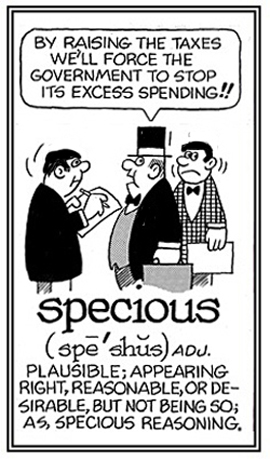
Go to this Word A Day Revisited Index
so you can see more of Mickey Bach's cartoons.
2. Relating to that portion of the mental area the processes of which are outside the range of attention.
3. A reference to that part of the mind that is not fully conscious but which is still able to influence actions, etc.
2. Descriptive of a person's mannerism which shows arrogant superiority to and disdain of those someone views as unworthy: Mark's mother looked at his clothes with a supercilious attitude.
3. Characteristic of someone's behavior which is disdainful or contemptuous and characterized by pride or scorn: Anyone who arches his or her eyebrows and looks down their nose at someone else is showing "a high brow" or supercilious face.
4. Etymology: from Latin super, "above" + cilium, "eyelid".
When someone raises his or her eyebrows, it doesn't necessarily mean that that person is disdainful, contemptuous, etc. Such action may also express surprise, curiosity, etc.



Go to this Word A Day Revisited Index
so you can see more of Mickey Bach's cartoons.
2. A reference to that which is unnecessary or needless: Linda set the table for ten birthday party guests; however, since two guests couldn’t come, she removed the superfluous dishes and silverware from the table and put them away.
3. Relating to possessing or spending more than what is necessary; extravagant: Andy's wife loved to buy new shoes quite often; as a result, she had a superfluous collection with many more than she could ever wear.

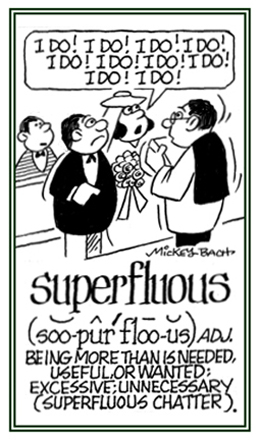
Go to this Word A Day Revisited Index
so you can see more of Mickey Bach's cartoons.
People are likely to fear what is unknown, such as the man who said he wasn't superstitious because he was afraid it might bring him bad luck!
2. Pertaining to or connected with unfounded beliefs: Ivy loved reading superstitious legends because they took her into a fantasy world full of myths and old wives' tales.
2. Relating to an action that is done in a sneaky procedure in order to avoid notice: The cat approached the mouse in a surreptitious way so it could get close enough to catch the rodent.
3. Etymology: in about 1443, from Latin surrepticius, "stolen, furtive, secret, clandestine"; from surreptus, past participle of surripere, "to seize, to take away secretly, to steal".
The word is made up of two parts: sub, "from under" (secretly) + rapere, "to snatch, to seize".

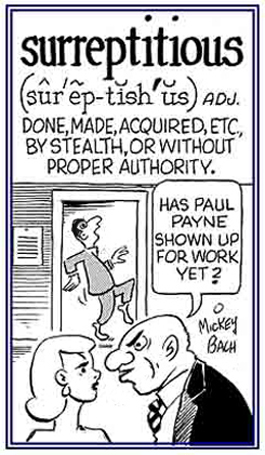
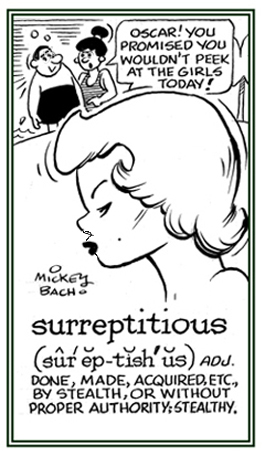
Go to this Word A Day Revisited Index
so you can see more of Mickey Bach's cartoons.
2. Tending to suspect; distrustful.
3. Exhibiting suspicion; such as, a suspicious glance.
As a mother of three, Jackie often has tedious work to do in her house, but it needs to be done.
The long tedious talk that the commentator made did not help his TV viewers have any interest in what he was talking about.
2. Conveying a dull, monotonous, unexciting, or unimaginative situation or activity: The tedious stage drama put the audience to sleep.Being tedious refers to a boring person who continues to talk long after his brain has ceased working.
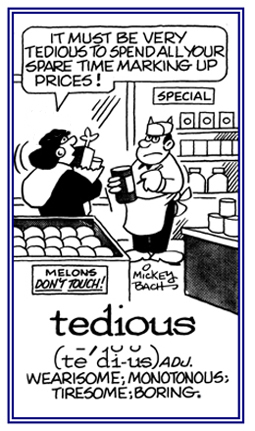
Go to this Word A Day Revisited Index
so you can see more of Mickey Bach's cartoons.
2. Relating to an emotionally turbulent and strong response: Sometimes Floyd and his colleague had tempestuous arguments about how to complete certain objectives that they were striving to achieve.

Go to this Word A Day Revisited Index
so you can see more of Mickey Bach's cartoons.
2. Relating to someone who is persistent and fully focused on achieving his or her objective: Ken was making a tenacious effort to complete his assignments as a reporter despite the dangers he was experiencing in the battle zone.
3. Relating to a machine or a person that is resolute and persistent in achieving a desired result as time and resources permit: The compiler of the contents of the special dictionary is a tenacious worker who is determined to provide much better contents for users who want to improve their vocabulary skills.
Computers are tenacious devices that are capable of retaining large amounts of information and of presenting it whenever a user wants to use it.
4. Physical conditions which cannot be remedied or made better: There are some tenacious ailments that doctors are unable to cure and which last for months or even years and come to an end only when a patient dies.


